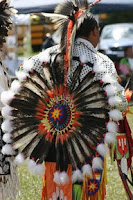what do you want for christmas?
 Santa rides the escalator. It's unbelievable, I know. You'd think with his ability to travel the globe in a singular night, he'd at least be able to call in a reindeer when he wants to get to the second floor of a mall. But, no. He rides the escalator. This is what Santa does when he's bored. He wanders. Not that he's been too bored lately. There has been a lot of kids who'd like a word with the man in red. Ah, Christmas. What would it be without Mr. Claus and us elves?
Santa rides the escalator. It's unbelievable, I know. You'd think with his ability to travel the globe in a singular night, he'd at least be able to call in a reindeer when he wants to get to the second floor of a mall. But, no. He rides the escalator. This is what Santa does when he's bored. He wanders. Not that he's been too bored lately. There has been a lot of kids who'd like a word with the man in red. Ah, Christmas. What would it be without Mr. Claus and us elves?
My life as an elf began with a simple, innocent reply to an employment ad on Craig's List: "Wanted: Photographer. Email resume and availability to address below..." Perfect, I thought. Dreams of driving around Vancouver, camera in hand and freedom to snap whatever and wherever filled my mind. Though, in hindsight, I should have been tipped off about the reality of the position by the email address to which I sent off my resume. It consisted of two words: "hyper" and "busy". Dense, Matt. Dense. One week later I found myself behind a camera in a North Vancouver mall, ringing bells in order to attract the wandering eyes of children before snapping their photo on Santa's knee. One by one, the families line up like dairy cows queuing for their daily milking. Then in ones and twos and threes and fours, the kids crowd around Santa, or simply sit on his knee. And await the question.
I'm not sure I ever grew up believing in Santa Claus. Either my parents never properly introduced us, or my older siblings ruined the falsity of it all at too early of an age for me to remember leaving milk and cookies out the night before Christmas. Come to think of it, we never really had a night before Christmas full of expectation. Our night before Christmas was our Christmas, and was always the same: church and then presents. So, unless I was told that Santa came while we were in church, I guess I never believed in the guy. And here I was, day in and day out, reinforcing the lie that the man in the centre of my viewing lens was the Santa Claus. "Say cheese!" Click.
While the image transfers from lens to computer to paper, Santa Claus has a one-on-one discussion of all matters important. He asks them their name and how old they are. He sits them on his knee and whispers gently in their ear stories of life in the North Pole. Watching him at work, watching the look in the eyes of a child as they are told the story of a magic apple almost makes me want to believe in him as surely as the children do. But when all of the formalities are finished, he comes to the moment every child who believes in him waits for. He asks the question.
"And what do you want for Christmas?"
I see this happen over and over again. The question is asked, and the list that has sat so patiently inside the mind spews out of innocent mouths. One child, as Santa tells me later, wants a Robot for Christmas. But not just any robot: "By the way, Santa," he says a few minutes later, "I want the robot to clean my room." I watch this scene play out, child after child, list after list. A young child jumps on Santa's lap and waits to be asked the question.
Enter a young girl, about 12 years old. She is dressed all in pink, and stands beside her father, waiting for a chance to sit on Santa's knee. But she must be patient, as there are many more children with a wish list on their minds.
"I want an iPod," says one child.
"Transformers!" yells another.
You almost wouldn't be able to tell there is something wrong with her, this twelve year old girl, if she only stood still. But then you see her walk. She limps a bit, evidently by her right leg, which seems to be unable to bend as well as the left. And then there's her arm. It doesn't move so well, either. In fact, it seems permanently stuck in an upright position, bent at the arm, holding her slightly contorted hand ever so close to her face. And still, she waits.
"I want a Barbie," a young girl announces.
"I want a Motorola Razr flip phone with a 3 year talk-and-text plan from Rogers." Teenagers.
The girl still waits. Perhaps it is autism that has stolen some of her ability. But she smiles. And when it is her turn, and Santa beckons her to come and sit on her knee, her smile grows ever wider. She will soon be asked the question. And so the young girl sits on Santa's knee. "Say Cheese!" Click. She continues to smile through the small talk, and patiently listens to Santa's reassuring words. Finally, the question. The question.
"And what do you want for Christmas?" he whispers.
"I want ... a new brain ..."
...so, what do you want for Christmas?




























